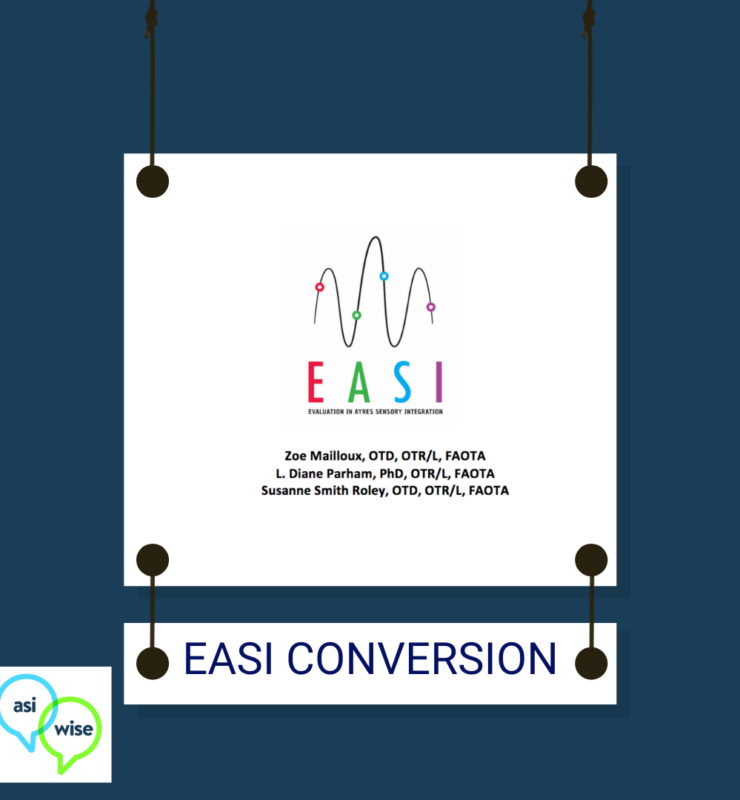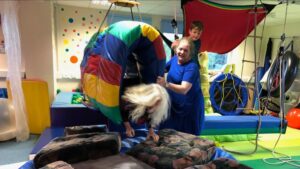ASI2 SIPT to EASI Conversion
£1,310.00

For Therapists
A Master Class in Assessment | Suitable for those who wish to upgrade from SIPT or who have completed learning about assessment without the EASI with other providers.
“I have enjoyed learning the EASI, the AASH and thinking about assessment across the lifespan” “Taught by experts. Though I am an Advanced Practitioner, I learnt so much about assessment – doing it live really helps” “The tutor groups have supported by day to day work – thank you”.
This route reflects your existing learning about assessment in Ayres’ SI without hands-on teaching and learning about SIPT or EASI.
This route and price include access and attendance on a minimum of 6 live Zoom Tutor sessions and submission of a Case Study assignment should you wish to APEL your EASI Conversion towards the internationally recognised CLASI Certification in Ayres’ SI*. (www.iceasi.org)
You will have 1 year’s free subscription to the EASI Scoring Platform (ESP) immediately after attending your CLASI M3.
*On completion of this conversion route, you would undertake ASI3/UUSI3, to APEL your prior learning to the CLASI CASI. This includes an additional Case Study focused on intervention with attendance at a minimum of 6 Tutor Sessions.


Need a Bespoke Workshop or Webinars
Bespoke Group Bookings
Register your interest and get updates for other webinars into your in-tray.
Book for a group
This module provides the opportunity for therapists to observe experts in ASI intervention strategies work with children in a clinic which meets the criteria outlined in the Fidelity Measure.
Participants use a supplied case to the course for analysis in small group and whole group discussions including interpretation of assessment findings, identified outcomes, and intervention strategies, design, and refinement of the fidelity to the ASI intervention principles. Module price includes dedicated tutoring in a peer group in our online virtual classroom space, where you will discuss and deepen your learning with your peers.
Expert therapists from across the globe will be sharing intervention case studies on M6. Dr Susanne Smith Roley will be sharing the latest research and evidence, building on your learning about Fidelity in M5. For therapists working with teens, adults and older adults, we will be exploring the application of ASI with adult clinical populations including how to adapt assessment methods, assessment tools specific to adult clinical populations, the importance of praxis to recovery and engagement in the therapy process. Break out spaces and post-module tutoring will allow those working in secure and acute high-risk clinical settings to explore and consider how to provide intervention in these restricted environments.
WHO CAN TAKE THIS COURSE?
Open to occupational therapists (OT), physical therapists (PT), and speech and language pathologists (SLP).
M1 – M4 or ASI1 – ASI2 or UUSI1 – UUSI2 are prerequisite to UUSI3/ASI3.
Upgrade to ASI1 from SIN1/SIE1 and EASI Conversion from SIN2/3 is also access to this module.
This module provides the foundation knowledge and skills to evaluate ASI as an evidence-based method, or frame of reference, for intervention. This module focuses on intervention planning from assessment, formulating the proximal outcomes that guide the selection of therapeutic activities and reaching and measuring distal participation-related outcomes. This module provides the student with foundation knowledge and skills to be able to implement intervention strategies, design, and refinement of the fidelity to the ASI intervention principles, as part of reflective practice.
Expert therapists will be sharing intervention case studies.
Dr Susanne Smith Roley will be sharing the latest research and evidence, building on your learning about Fidelity in part one of this module [CLASI M5]. For therapists working with teens, adults and older adults, we will be exploring the application of ASI with adult clinical populations including how to adapt assessment methods, assessment tools specific to adult clinical populations, the importance of praxis to recovery and engagement in the therapy process. Break out spaces and post-module tutoring will allow those working in secure and acute high-risk clinical settings to explore and consider how to provide intervention in these restricted environments.
The student is introduced to the intervention principles of ASI and to the concept of “fidelity” to an intervention; specific instruction is provided about fidelity measures, in general, and the appropriate use of the Ayres Sensory Integration Fidelity Measure (ASIFM). It will provide the opportunity to observe experts in ASI demonstrate intervention planning and delivery of AYRES Sensory Integration in a range of settings so that the student can transfer this learning to their own clinical setting.
LEARNING OUTCOMES
Successful students will be able to:
Use dynamic assessment and advanced clinical reasoning while working with clients to refine the intervention during treatment, linking the hypothesis from assessment with therapeutic proximal goals toward meeting proximal, participation-related outcomes.
Name the process elements of the ASI Intervention Fidelity Measure and determine the the way in which the process elements interact during a direct intervention session.
Explain the relationship between the activities and the facilitation of adaptive responses; the importance of the client’s motivation and active involvement during the intervention.
Be able to consider and apply how relevant sensory strategies are implemented, analysing this across and within various contexts and environments.
Discuss the benefits and limitations of ASI intervention with a wide variety of diagnostic groups, ages, and types of difficulties.
CONTENT
Evaluation of ASI as an evidence-based method; frame of reference, for intervention.
Introduction to the intervention principles of ASI and to the concept of “fidelity” to an intervention.
Fidelity measures and the appropriate use of the Ayres Sensory Integration Fidelity Measure (ASIFM).
ASI and other treatment methods as part of OT, PT or SLT clinical practice; structure and process of the intervention.
Intervention planning from assessment to using the data-driven decision-making process.
Formulating proximal outcomes to guide the selection of therapeutic activities to reach, measure and report distal participation-related outcomes.
Interpretation of assessment findings identified outcomes and intervention strategies, design, and refinement of fidelity to the ASI intervention principles
LEARNING AND TEACHING METHODS
Students will learn online through multi-media methods. For example, online lectures will be used to present core material for the module. They will provide students with the theoretical and clinical knowledge base.
Lectures will incorporate workshop activities where students will have the opportunity to engage with clinical data, assessments and associated materials to further develop their understanding of principles and practice in the management of people with sensory processing and integration challenges.
Use of clinical data and case study materials will help to incorporate the service user voice and perspective and experience into learning.
Online forum discussions in tutor groups will support the student in their learning.
Students will be expected to read relevant literature to support their learning and will have access to Ulster University’s library online.
Develop and enhance their clinical skills through reflective practice while applying an ASI framework to a case study under appropriate clinical tutoring and peer review.
Video materials available online will be utilised to consider and understand fidelity in support of reflective practice.
See module details